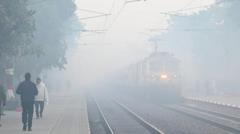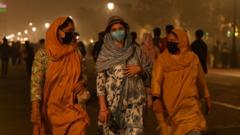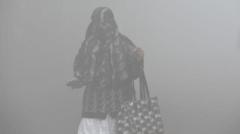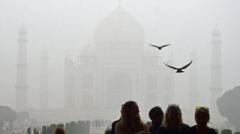Authorities in Lahore respond to unprecedented air pollution, impacting millions as schools close and workers are ordered to stay home.
Record Air Pollution Chokes Lahore, Leading to Hundreds of Hospitalizations

Record Air Pollution Chokes Lahore, Leading to Hundreds of Hospitalizations
Lahore's air quality reaches hazardous levels, prompting governmental intervention to protect public health.
The city of Lahore, with a population of 13 million, is grappling with a severe air pollution crisis, leading to significant health warnings and public health measures. On Wednesday, local officials reported that the Air Quality Index in Lahore hit alarming levels, ranking it as the world's most polluted city, according to the Swiss air quality monitoring platform, IQAir. This drastic deterioration in air quality has already resulted in hundreds of hospitalizations and left many residents struggling to breathe.
In response to the deteriorating environment, the government of Punjab Province has implemented several urgent actions. Measures include the closure of all primary and secondary schools until at least November 17, as well as the imposition of a mandatory work-from-home directive for half of the city's workforce. Senior officials have emphasized the seriousness of the situation, cautioning that the oppressive smog could persist for an additional 10 days.
Residents describe the conditions as debilitating, with many unable to carry out normal activities such as walking outside without experiencing physical discomfort. Local gardeners like Safdar Masih expressed the harrowing reality of trying to breathe in such hazardous conditions. Furthermore, with the air pollution exacerbating health issues, the provincial government has urged the population to wear masks when outdoors.
The public health interventions also extend to regulatory actions targeting vehicles and industries responsible for the pollution, including the banning of rickshaws and the shutdown of environmentally harmful businesses. Nariman Piro, an environmental activist, emphasized that the widespread pollution and resultant health crisis must be addressed holistically, calling for greater accountability from both public officials and local industries.
As Lahore faces this public health emergency, experts and activists continue to stress the importance of long-term strategies to better manage air quality and protect the health of millions living in the region.
In response to the deteriorating environment, the government of Punjab Province has implemented several urgent actions. Measures include the closure of all primary and secondary schools until at least November 17, as well as the imposition of a mandatory work-from-home directive for half of the city's workforce. Senior officials have emphasized the seriousness of the situation, cautioning that the oppressive smog could persist for an additional 10 days.
Residents describe the conditions as debilitating, with many unable to carry out normal activities such as walking outside without experiencing physical discomfort. Local gardeners like Safdar Masih expressed the harrowing reality of trying to breathe in such hazardous conditions. Furthermore, with the air pollution exacerbating health issues, the provincial government has urged the population to wear masks when outdoors.
The public health interventions also extend to regulatory actions targeting vehicles and industries responsible for the pollution, including the banning of rickshaws and the shutdown of environmentally harmful businesses. Nariman Piro, an environmental activist, emphasized that the widespread pollution and resultant health crisis must be addressed holistically, calling for greater accountability from both public officials and local industries.
As Lahore faces this public health emergency, experts and activists continue to stress the importance of long-term strategies to better manage air quality and protect the health of millions living in the region.






















